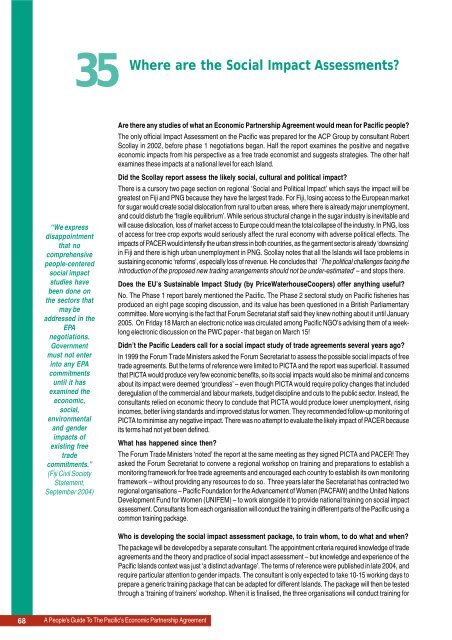REPA Booklet - Stop Epa
REPA Booklet - Stop Epa
REPA Booklet - Stop Epa
You also want an ePaper? Increase the reach of your titles
YUMPU automatically turns print PDFs into web optimized ePapers that Google loves.
35<br />
Where are the Social Impact Assessments?<br />
Are there any studies of what an Economic Partnership Agreement would mean for Pacific people?<br />
The only official Impact Assessment on the Pacific was prepared for the ACP Group by consultant Robert<br />
Scollay in 2002, before phase 1 negotiations began. Half the report examines the positive and negative<br />
economic impacts from his perspective as a free trade economist and suggests strategies. The other half<br />
examines these impacts at a national level for each Island.<br />
“We express<br />
disappointment<br />
that no<br />
comprehensive<br />
people-centered<br />
social impact<br />
studies have<br />
been done on<br />
the sectors that<br />
may be<br />
addressed in the<br />
EPA<br />
negotiations.<br />
Government<br />
must not enter<br />
into any EPA<br />
commitments<br />
until it has<br />
examined the<br />
economic,<br />
social,<br />
environmental<br />
and gender<br />
impacts of<br />
existing free<br />
trade<br />
commitments.”<br />
(Fiji Civil Society<br />
Statement,<br />
September 2004)<br />
Did the Scollay report assess the likely social, cultural and political impact?<br />
There is a cursory two page section on regional ‘Social and Political Impact’ which says the impact will be<br />
greatest on Fiji and PNG because they have the largest trade. For Fiji, losing access to the European market<br />
for sugar would create social dislocation from rural to urban areas, where there is already major unemployment,<br />
and could disturb the ‘fragile equilibrium’. While serious structural change in the sugar industry is inevitable and<br />
will cause dislocation, loss of market access to Europe could mean the total collapse of the industry. In PNG, loss<br />
of access for tree crop exports would seriously affect the rural economy with adverse political effects. The<br />
impacts of PACER would intensify the urban stress in both countries, as the garment sector is already ‘downsizing’<br />
in Fiji and there is high urban unemployment in PNG. Scollay notes that all the Islands will face problems in<br />
sustaining economic ‘reforms’, especially loss of revenue. He concludes that ‘The political challenges facing the<br />
introduction of the proposed new trading arrangements should not be under-estimated’ – and stops there.<br />
Does the EU’s Sustainable Impact Study (by PriceWaterhouseCoopers) offer anything useful?<br />
No. The Phase 1 report barely mentioned the Pacific. The Phase 2 sectoral study on Pacific fisheries has<br />
produced an eight page scoping discussion, and its value has been questioned in a British Parliamentary<br />
committee. More worrying is the fact that Forum Secretariat staff said they knew nothing about it until January<br />
2005. On Friday 18 March an electronic notice was circulated among Pacific NGO’s advising them of a weeklong<br />
electronic discussion on the PWC paper - that began on March 15!<br />
Didn’t the Pacific Leaders call for a social impact study of trade agreements several years ago?<br />
In 1999 the Forum Trade Ministers asked the Forum Secretariat to assess the possible social impacts of free<br />
trade agreements. But the terms of reference were limited to PICTA and the report was superficial. It assumed<br />
that PICTA would produce very few economic benefits, so its social impacts would also be minimal and concerns<br />
about its impact were deemed ‘groundless’ – even though PICTA would require policy changes that included<br />
deregulation of the commercial and labour markets, budget discipline and cuts to the public sector. Instead, the<br />
consultants relied on economic theory to conclude that PICTA would produce lower unemployment, rising<br />
incomes, better living standards and improved status for women. They recommended follow-up monitoring of<br />
PICTA to minimise any negative impact. There was no attempt to evaluate the likely impact of PACER because<br />
its terms had not yet been defined.<br />
What has happened since then?<br />
The Forum Trade Ministers ‘noted’ the report at the same meeting as they signed PICTA and PACER! They<br />
asked the Forum Secretariat to convene a regional workshop on training and preparations to establish a<br />
monitoring framework for free trade agreements and encouraged each country to establish its own monitoring<br />
framework – without providing any resources to do so. Three years later the Secretariat has contracted two<br />
regional organisations – Pacific Foundation for the Advancement of Women (PACFAW) and the United Nations<br />
Development Fund for Women (UNIFEM) – to work alongside it to provide national training on social impact<br />
assessment. Consultants from each organisation will conduct the training in different parts of the Pacific using a<br />
common training package.<br />
Who is developing the social impact assessment package, to train whom, to do what and when?<br />
The package will be developed by a separate consultant. The appointment criteria required knowledge of trade<br />
agreements and the theory and practice of social impact assessment – but knowledge and experience of the<br />
Pacific Islands context was just ‘a distinct advantage’. The terms of reference were published in late 2004, and<br />
require particular attention to gender impacts. The consultant is only expected to take 10-15 working days to<br />
prepare a generic training package that can be adapted for different Islands. The package will then be tested<br />
through a ‘training of trainers’ workshop. When it is finalised, the three organisations will conduct training for<br />
68<br />
A People’s Guide To The Pacific’s Economic Partnership Agreement
















